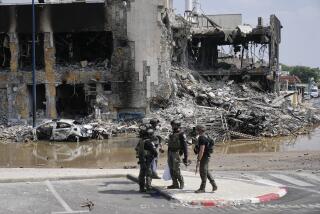Don’t Play Into Saddam’s Showdown Plan
- Share via
Saddam Hussein is an unusual adversary, one driven by an energy source unfamiliar to conventional thinking. His tyrannical resilience, however, illuminates larger questions regarding the chronic contest of wills between him and the United States.
Saddam’s noncompliance with U.N. weapon inspectors is likely to result in another U.S. military spanking. The results will be familiar: Iraqi civilians will die. Buildings will be felled. Arab allies to the U.S. will be further alienated. Russia will be miffed. Evidence of nuclear, biological and chemical weapon technology will remain elusive. And Saddam? Well, he’ll survive again. Each time he survives, he appears to get stronger. The U.S. is then right back where it started, trying to do a job nobody wants.
Let us not forget that before Iraq’s invasion of Kuwait in 1990, Saddam Hussein was a creature of U.S. foreign policy. He was instrumental in our need to contain Iran. Saddam got greedy and bit the hand that fed him, which in turn caused people of several nations great suffering. And the suffering continues.
Shortly after the Gulf War, I was part of a public health-scientific team organized by Harvard University and others to chronicle the war’s impacts on the Iraqi civilian infrastructure. The study team detailed the comprehensive damage to Iraq’s environment and public health caused by U. S.-led forces. The team also found that economic sanctions against Iraq picked up where the war left off. Many civilians, especially children, have died, which has provided Saddam with humanitarian ammunition. Unfortunately, this information was not heeded in the United States.
As the news flashes continue of Saddam’s defiance, I am reminded of the billboard depictions of him throughout Iraq: Saddam leading his troops into battle, kissing a baby, building a school or hospital, saving the Arabs, praying to Allah. There wasn’t a city block spared his ubiquitous omnipotence. This crude form of propaganda mirrors the narcissistic gratification of despotic regimes seen throughout generations. This narcissism also speaks to the core of hostilities between Iraq and the U.S.
Victory often produces hatred in the vanquished. Saddam knows he lost the war but his honor forbids retreat. Profound rage has emerged as a result of his narcissistic injuries. His behavior is reminiscent of Nietzsche’s warning that narcissism is not just a retreat but often the prelude to attack. Saddam knows conflict serves many purposes. It is his chance to humiliate those he envies.
But the U.S. has suffered its narcissistic wounds as well, since Saddam will not allow us to dictate our peace with honor. For the U.S., Saddam cannot be allowed to act out his rage, so it does what it can to stop him, even though history reminds us that conflict as a solution is also a compounder of the problem. In a complex world, we will always have adversaries. But in the grip of unreason, the U.S. transforms its adversaries into evil enemies. How else to explain defeat militarily or the inability to dictate outcomes politically. The narcissist solution is the compensatory “showdown.”
“Dishonor is worse than death,” says a god in the Bhagavad-Gita. This is what keeps Saddam going and going.
More to Read
Sign up for Essential California
The most important California stories and recommendations in your inbox every morning.
You may occasionally receive promotional content from the Los Angeles Times.













